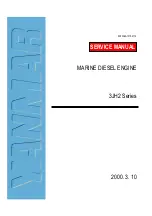
The following section includes some considerations on the engine performance variations according
to the environmental conditions. However, IVECO reserves the right, when negotiating the contract,
to assess every single application to choose the most suitable engine setting and define the possible
“derating”.
Ambient temperature
A high temperature can lead to the engine power reduction, as a result of the air rarefaction, and there-
fore generate cooling, lubrication and onboard system operating problems. It can be due to the climate
conditions or an insufficient ventilation of the engine room.
The power reduction in aspirated engines amounts to 2% every y 5.5 °C increase above the reference
temperature of the test rule.
The reduction of power in supercharged engines depends on the work margin of the compressor and
the available supercharging pressure and, if present, on the efficiency of the air-water exchanger. It can
be null when there is more supercharging pressure and with an air-water exchanger having the right
size, or it can be equal to the percentage values mentioned for the aspirated engines.
When the temperature is below the reference value, there is no power reduction. Below certain val-
ues, it could be difficult to start the engine or some systems may be faulty.
Height
The engine operation at a high altitude, as a result of the lower atmospheric pressure, can lead to a
reduction of the quantity of air sucked and thus to a lower torque and power, compared to the typical
engine performance curves.
The lower performances depend on the characteristics of the turbocharger, where present, and of the
engine setting, i.e. of the air system capacity to compensate for the air rarefaction with a higher volume
of air inlet. On aspirated engines there might be, up to 2500 m in height, a power loss of 3.5 % every
300 m of difference in height, while on supercharged engines with turbine fitted with waste gate the
power reduction can be between zero and approx. 2.5% every 300 m of difference in height, accord-
ing to the size, type and matching of the turbocharger.
For a different adjustment of the quantity of injected fuel, the “derating” becomes necessary for those
applications where the critical height is exceeded for a long time and above which there is no com-
pensation for the quantity of air inlet. The derating becomes also necessary as a result of a lower
counter-pressure at the exhaust which leads to the turbocharger overspeed conditions and as a result
of the reduction of the water boiling temperature caused by a lower atmospheric pressure.
Humidity
The engine setting for its use in conditions of high air humidity does not happen frequently, save for the
operation in environments constantly above 60% of the relative humidity, as in Tropical forests.
In these cases it can be foreseen that every 10% increase of the relative humidity above 60% there can
be a derating of:
■
0,5% for ambient temperature of 30 °C
■
1% for ambient temperature of 40 °C
■
1.5% for ambient temperature of 50 °C
The “derating” is managed by IVECO during the contractual negotiations according to the operating
conditions of the boat supplied by the Customer.
MARCH 2004
ENGINE/BOAT CHOICE FACTORS
2.30
MARINE ENGINES INSTALLATION
Summary of Contents for Marine Diesel Engines
Page 1: ...MARINE DIESEL ENGINES INSTALLATION HANDBOOK T E C H N O L O G I C A L E X C E L L E N C E ...
Page 8: ...MARCH 2004 INTRODUCTION 1 8 MARINE ENGINES INSTALLATION ...
Page 24: ...MARCH 2004 ENGINE BOAT CHOICE FACTORS 2 24 MARINE ENGINES INSTALLATION ...
Page 34: ...MARCH 2004 DRIVE 3 34 MARINE ENGINES INSTALLATION ...
Page 50: ...MARCH 2004 DRIVE 3 50 MARINE ENGINES INSTALLATION ...
Page 52: ...MARCH 2004 ENGINE INSTALLATION 4 52 MARINE ENGINES INSTALLATION ...
Page 60: ...MARCH 2004 AIR SUPPLY 5 60 MARINE ENGINES INSTALLATION ...
Page 64: ...MARCH 2004 AIR SUPPLY 5 64 MARINE ENGINES INSTALLATION ...
Page 66: ...MARCH 2004 FUEL SUPPLY 6 66 MARINE ENGINES INSTALLATION ...
Page 74: ...MARCH 2004 FUEL SUPPLY 6 74 MARINE ENGINES INSTALLATION ...
Page 76: ...MARCH 2004 LUBRICATION 7 76 MARINE ENGINES INSTALLATION ...
Page 80: ...MARCH 2004 LUBRICATION 7 80 MARINE ENGINES INSTALLATION ...
Page 82: ...MARCH 2004 COOLING 8 82 MARINE ENGINES INSTALLATION ...
Page 92: ...MARCH 2004 DISCHARGE 9 92 MARINE ENGINES INSTALLATION ...
Page 98: ...MARCH 2004 DISCHARGE 9 98 MARINE ENGINES INSTALLATION ...
Page 100: ...MARCH 2004 AUXILIARY SERVICES 10 100 MARINE ENGINES INSTALLATION ...
Page 104: ...MARCH 2004 AUXILIARY SERVICES 10 104 MARINE ENGINES INSTALLATION ...
Page 106: ...MARCH 2004 CONTROLS 11 106 MARINE ENGINES INSTALLATION ...
Page 110: ...MARCH 2004 ELECTRICAL INSTALLATION 12 110 MARINE ENGINES INSTALLATION ...
Page 120: ...MARCH 2004 GALVANIC CORROSION PROTECTION 13 120 MARINE ENGINES INSTALLATION ...
Page 126: ...MARCH 2004 CONTROL TEST PROCEDURES 14 126 MARINE ENGINES INSTALLATION ...
Page 131: ......
















































